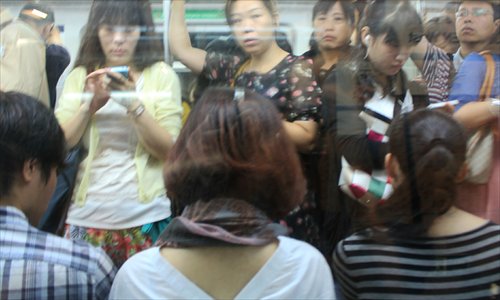Beijing faces congested month

Passengers wait while trapped at the Jiaomenxi Station on Line 4 of the Beijing subway on Monday morning. Photo: CFP
The Beijing Municipal Commission of Transport has announced that as of Monday, Beijing has been experiencing the worst traffic congestion of the month, and that September is expected to be the most congested month of the year due to a series of holidays starting from Monday.
The commission said that there has been up to eight hours of severe congestion each day.
Monday and the following two days, leading up to Mid-Autumn Festival, will see traffic jams worsening, with two peaks in the morning, the commission said, adding that there will be periods of congestion from 2 pm to 8 pm, resulting in around eight hours of congestion each day, including the morning periods.
Rainfall predicted by the meteorological department will further aggravate the congestion, the commission said.
During the two holidays - Mid-Autumn Festival on Thursday and the National Holiday starting on October 1 - the city will see a total of 190 million passengers using public transport, the commission predicted, adding that a total of at least 10 million passengers will travel by subway on two particular days - the day before Mid-Autumn Festival and the day before the National Day holiday.
To ease congestion during the holidays the government will provide 19,000 buses and will reduce the intervals between subway arrivals, in order to alleviate the pressure put on surface transportation, the commission said, adding that the capacity of Line 6 of the Beijing Subway will increase by 33 percent by running every three minutes instead of every four.
Amid a package of measures revealed by the commission Monday to alleviate congestion during the holidays, the government will set up "no car zones" in some areas on September 22, which has been dubbed "No Car Day," to encourage the public to opt for public transport, traveling on foot or cycling instead of driving cars.
The measures, such as boosting public transport and the launch of "No Car Day" will be effective in the short term to ease congestion during the holidays, said Cheng Shidong, a scholar at the Institute of Comprehensive Transportation of the National Development and Reform Commission, while also highlighting the importance of long term measures such as congestion charges and traffic restrictions.
With the heavy congestion this week, the news that Line 4 of the Beijing Subway was halted on Monday at 7:22 am further added to anxieties.
Thousands of passengers were trapped due to a signal failure on Line 4 and its extension, the Daxing Line, said the Beijing MTR Corporation on Monday. A statement from the corporation said that the service resumed at 9 am and apologized for the inconvenience.